1. In the living room, Paula lazed on the sofa, an open book propped on her knees.
2. I heard you ride out again.
3. A tall slender woman shifted out of someone's way, her pale blond hair gleaming in the club's soft lighting.
4. I'll have a listing agreement ready for you to sigh.
5. She saw the young girl at the desk watching her.
6. He watched Laura climb the steps to her room.
7. He let the silence between them build for a time.
8. The real cause of the explosion was evident enough for everyone to discuss it.
9. I'm getting scripts sent to me every day for you to read.
10. Did you want me to leave a note for Dad to call you?
11. He didn't want to see her being swept into the power struggles.
12. It would be a sin for her to throw away a chance like this.
13. Then I had to get John to open the door, which made worse, it being him.
14. She looked at him, her eyes cold, killing.
15. But she was looking out the side window, her face averted.
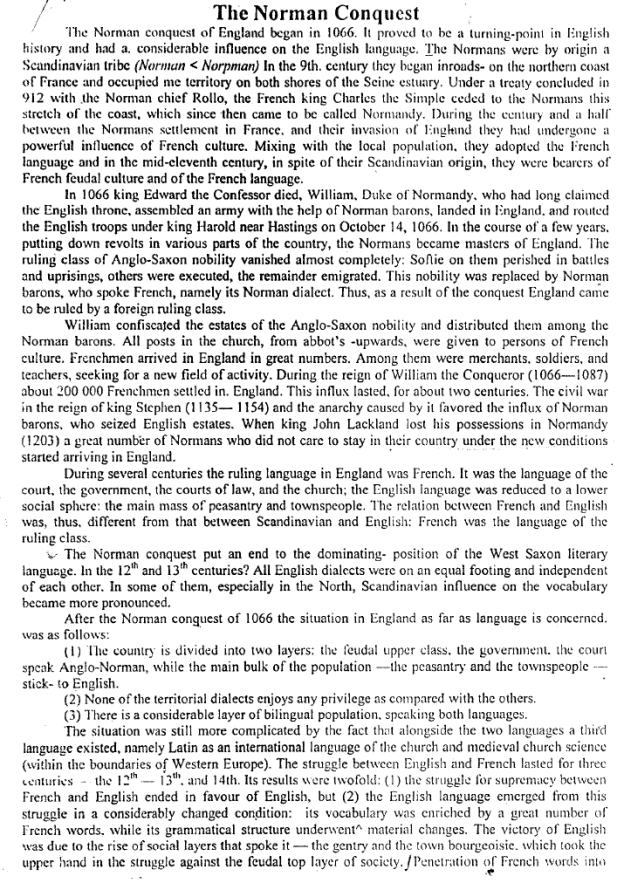
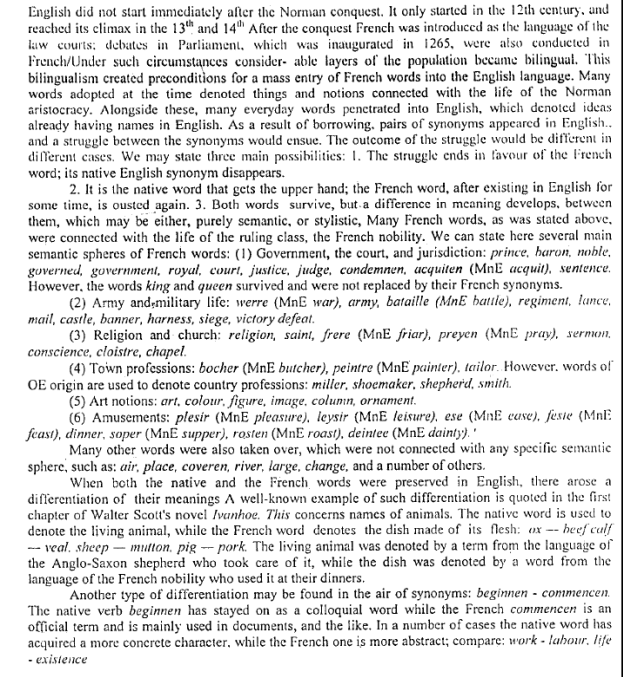


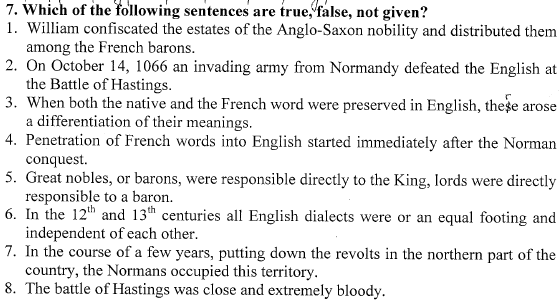



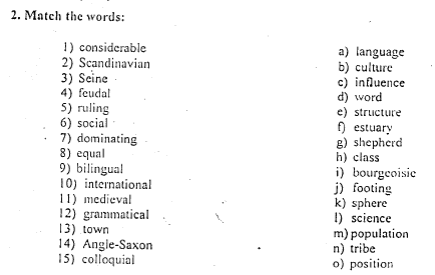
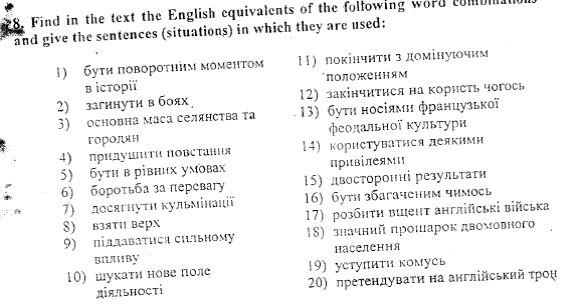
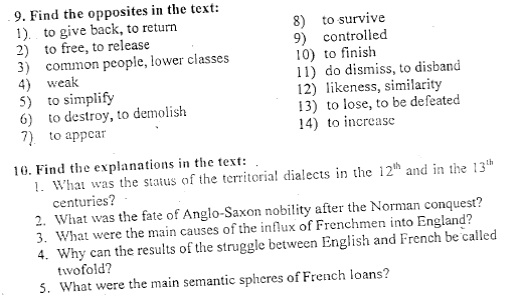


Listen and answer the questions:
1. Why is the Norman Conquest called as Уthe very opposite of democracyФ?
2. What are the Уgrim remindersФ of the Norman Conquest? Where can we still see them? How many of them have remained?
3. What was the difference in the location of Anglo-Saxon and Norman castles? What was the reason for that? What sis
4. Did the Saxons try to fight back? Did they succeed?
5. In what way was William Уthe new type of kingФ?
6. What made William a powerful king, what kept him strong?
7. What did William order to do one year before his death?
8. What information did the Doomsday Book contain?
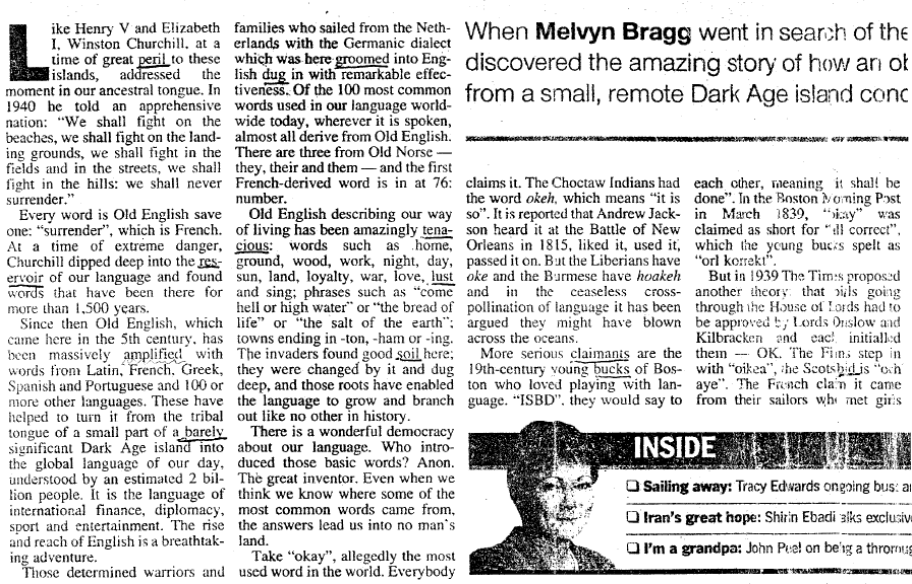
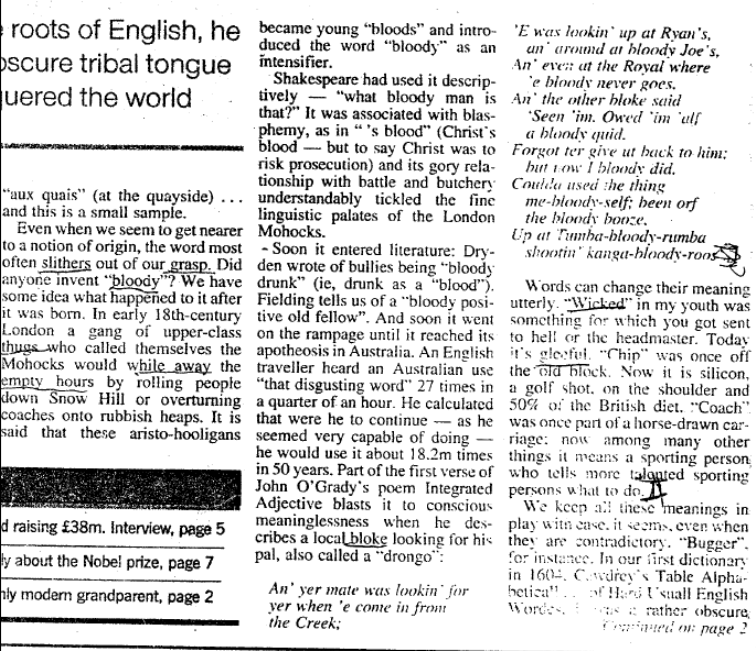
Answer the questions:
1) What language did Winston Churchill address the nation in? How is the language named in the article? Why do you think Churchill used this language?
2) When did English (Old English) arrive in the British Isles? What languages has it been amplified with since then? What did these languages help English to do?
3) What spheres is English used in nowadays?
4) What is the origin of the 100 most common words used in the present-day language? Find the words from Old Norse and the first word, derived from French.
5) Who introduced the most common words?
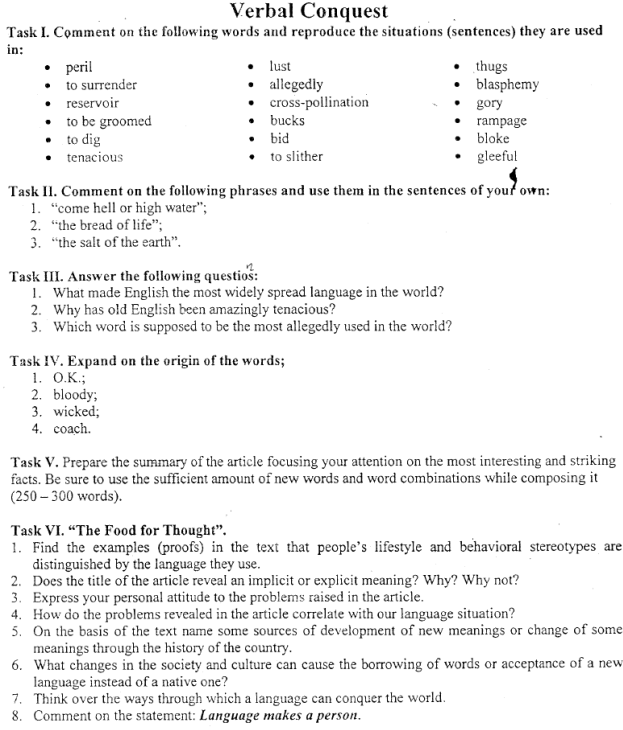
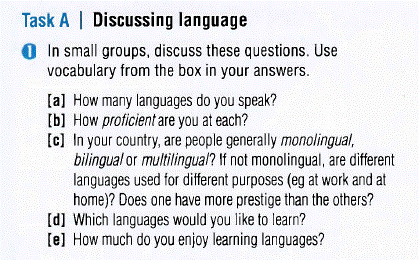
|
A Global Language?
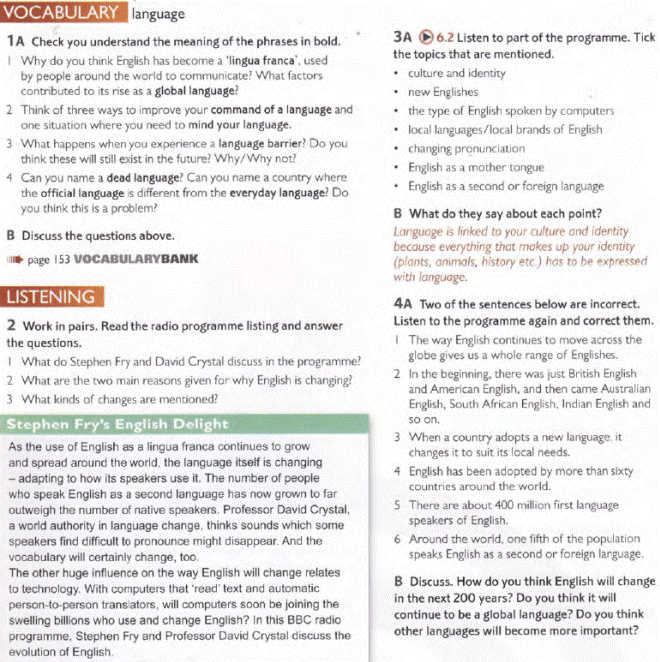
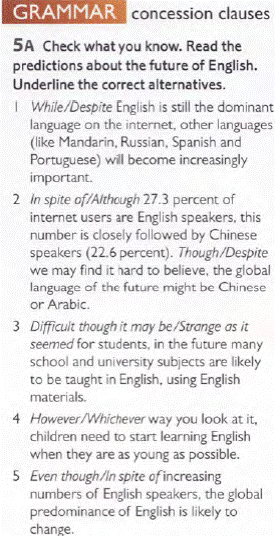
| 
|
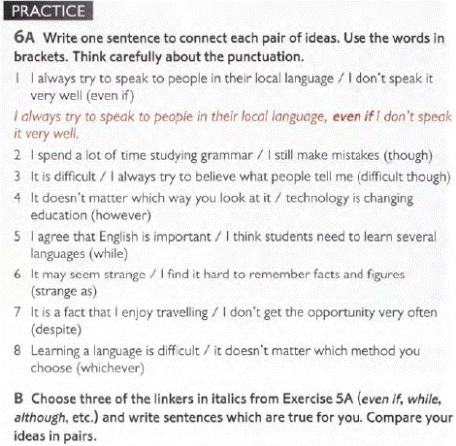
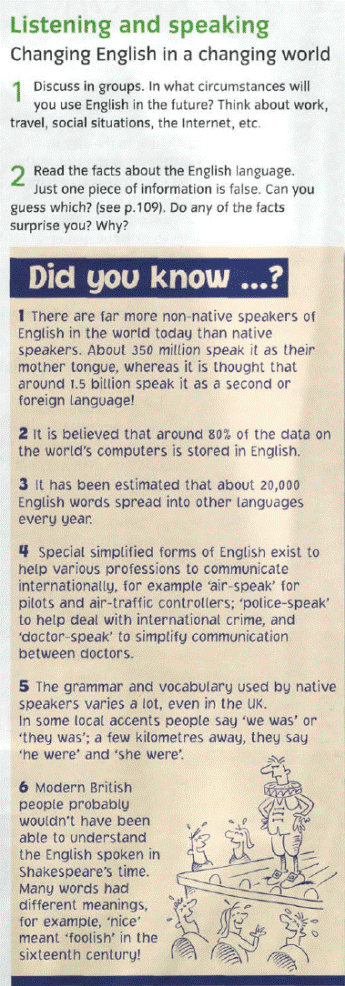
| 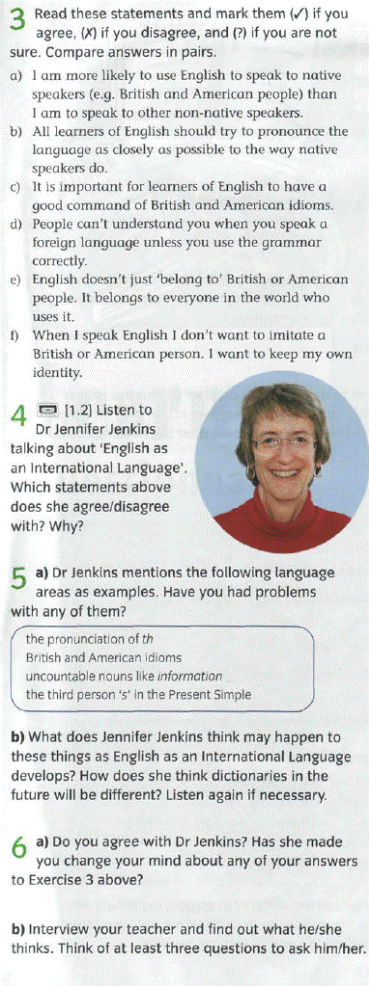
| ||
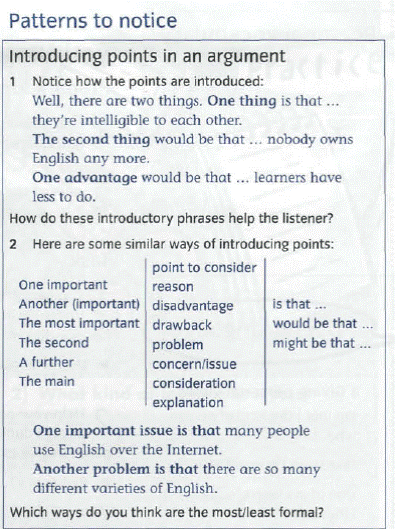
| 
| ||
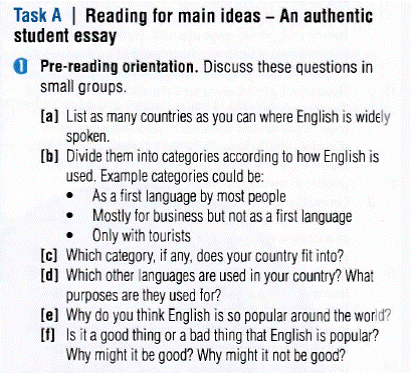
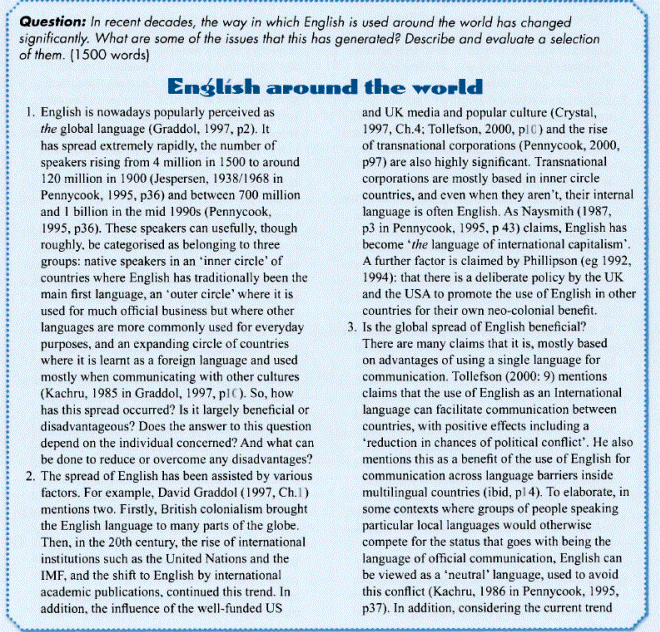
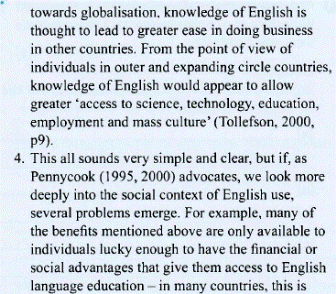
| 
|
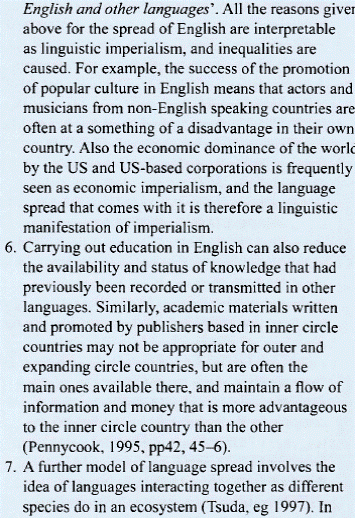 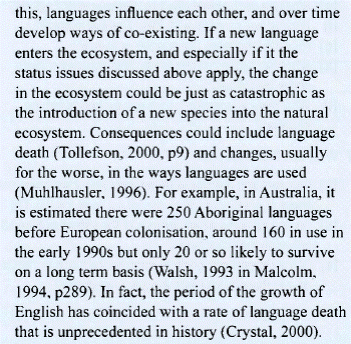 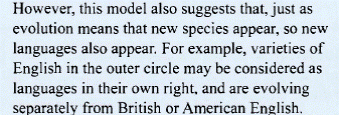
| 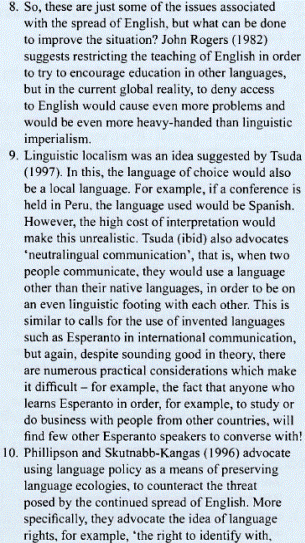
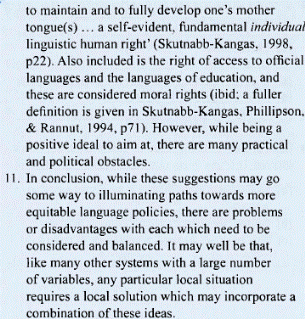
|

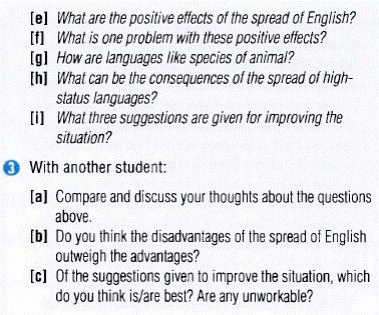
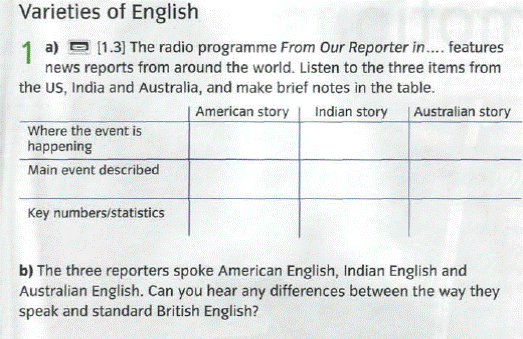
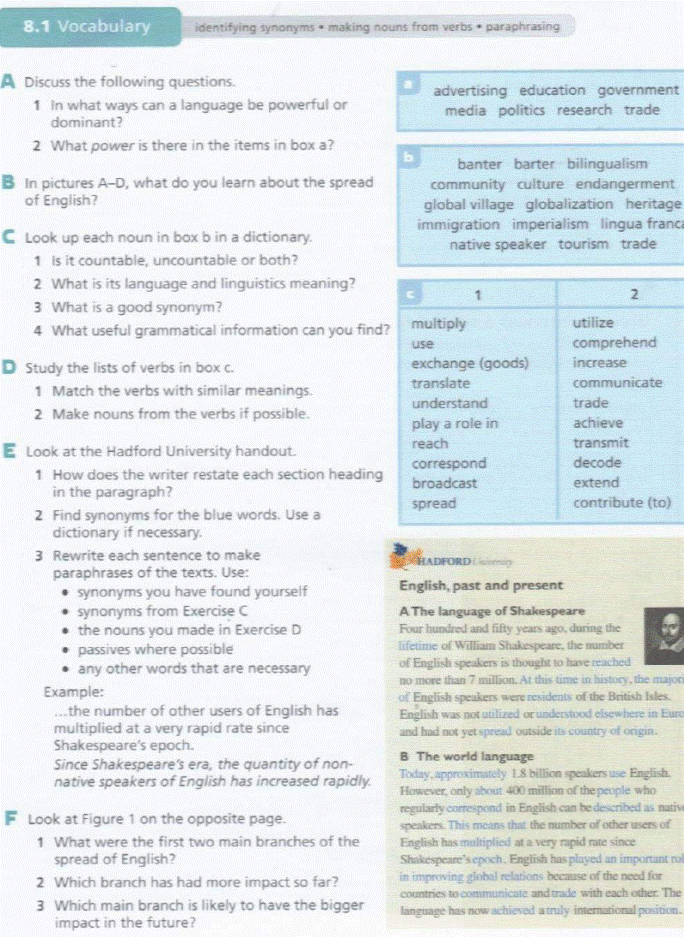
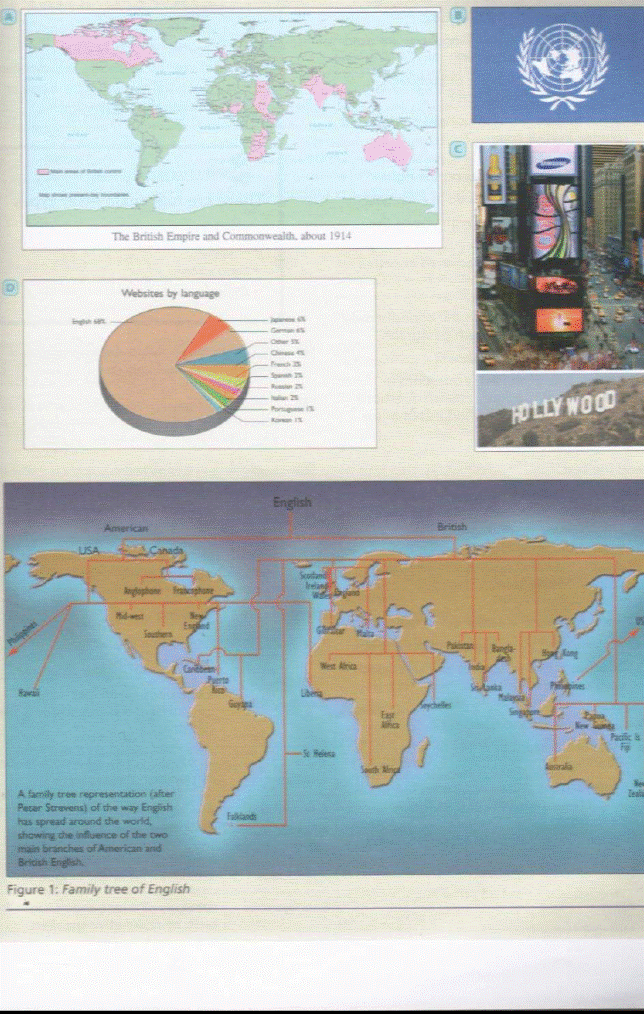
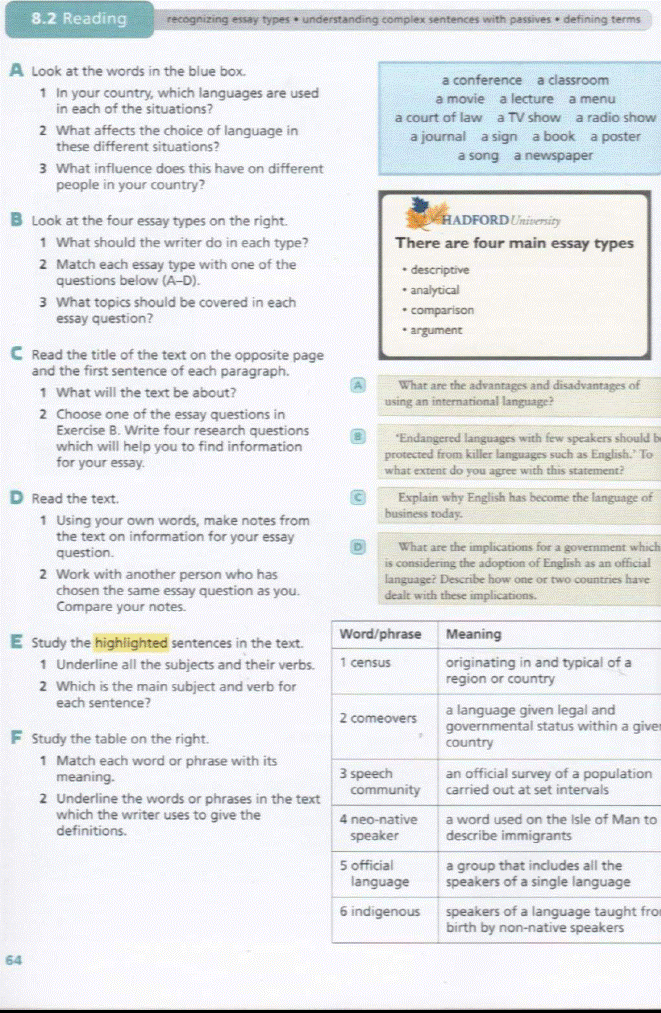
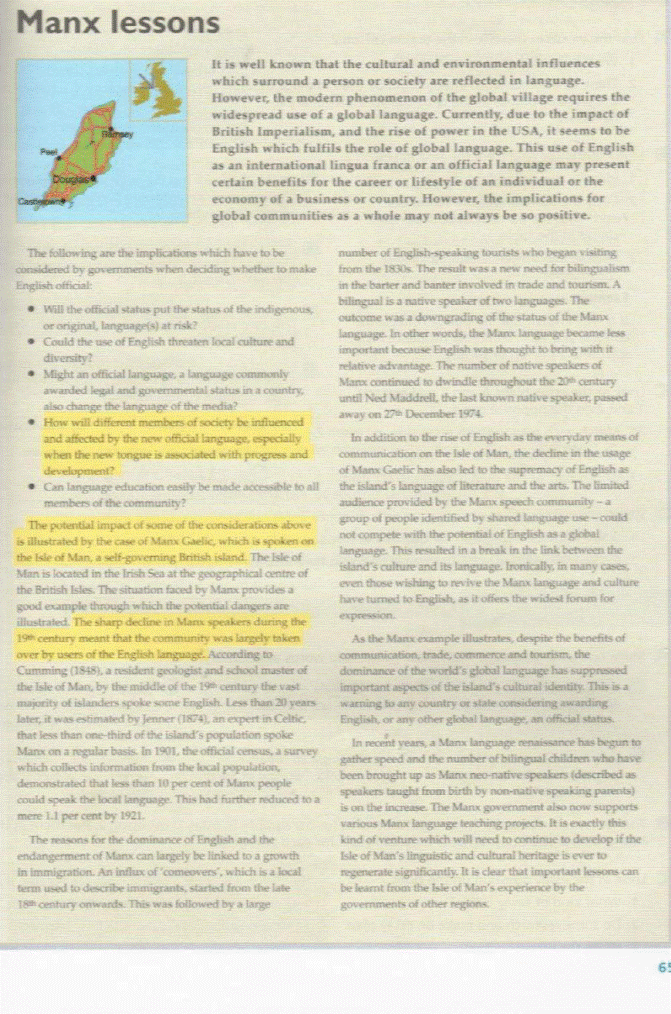
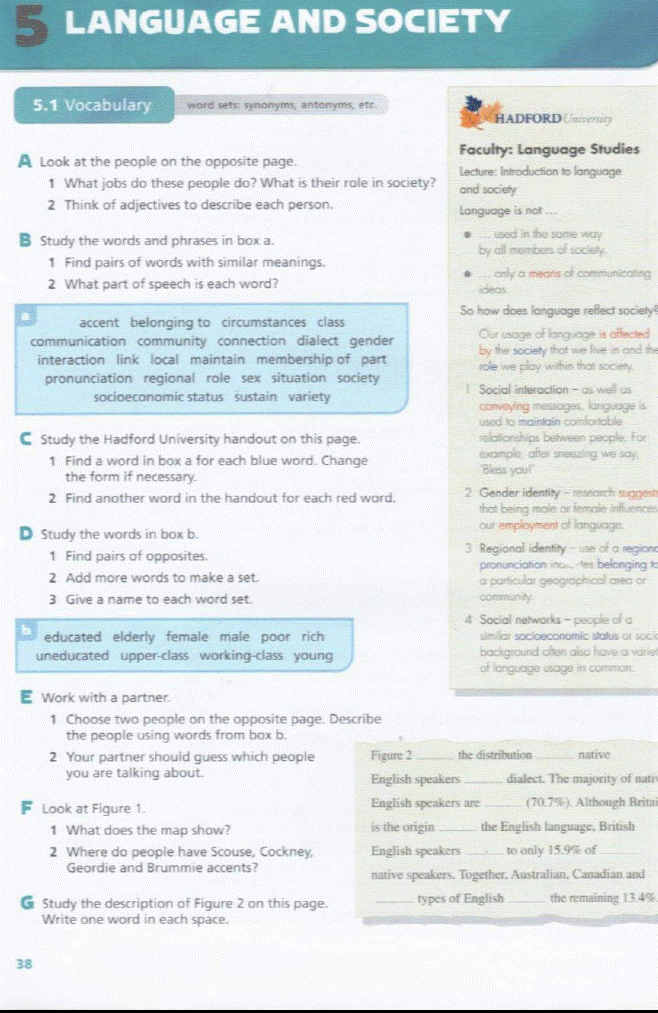
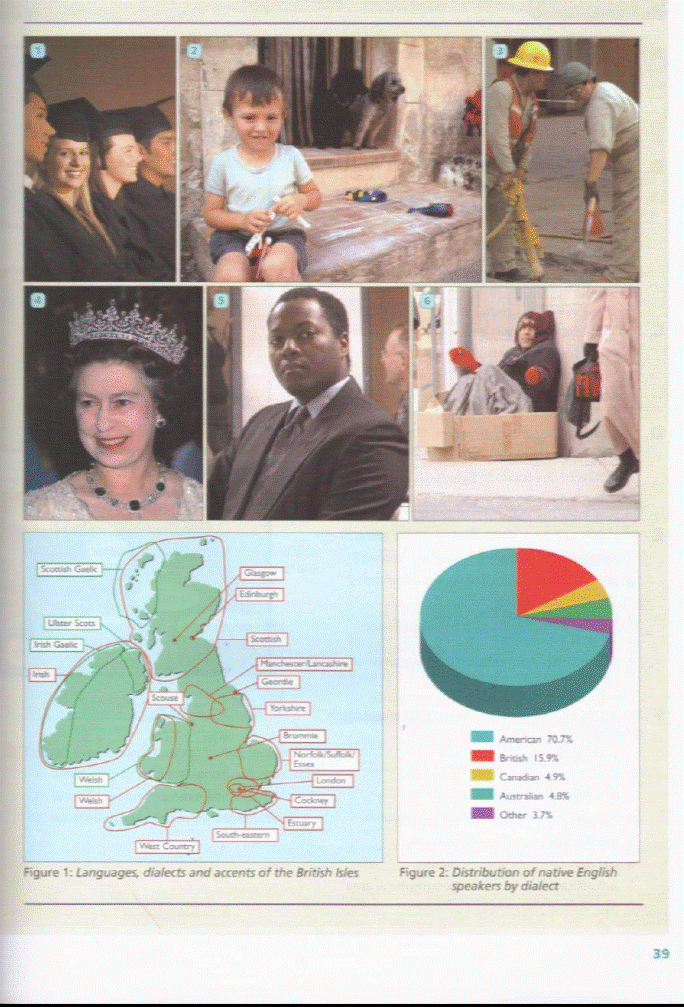
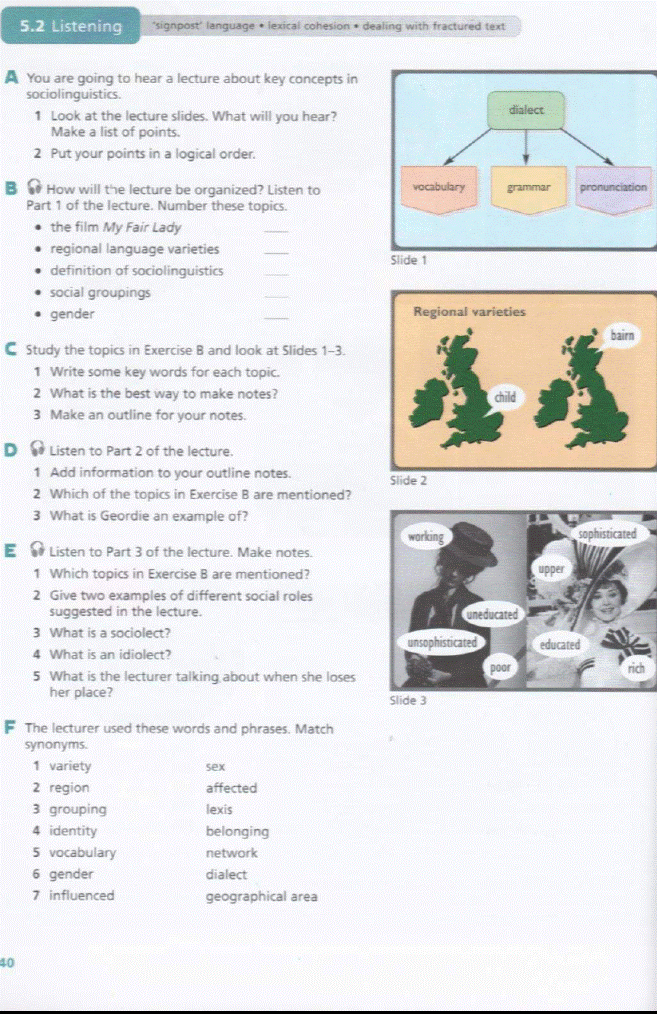
Do You Speak My Language? Considering the Relationship Between Language and Culture
Overview | What does culture mean in an increasingly globalized, connected world? What is the relationship between language and culture?
Warm-Up
1. Make a list in their journals of words you associate with a particular culture. As an example, think about words used at school that УoutsidersФ wouldnТt understand. You might also consider jargon used by people in a particular profession, contemporary slang used among friends and/or online and even words that are part of a corporate culture.
|
|
|
2. Share examples and discuss some or all of the following questions:
Ј Why do some groups create and use their own languages?
Ј What are the effects of having shared a vocabulary and language?
Ј How does language reflect culture? How does language shape culture?
Ј What exactly is culture? Is it static or fixed?
Ј How do new technologies and the Internet affect culture?
3. Discuss what it means for languages to УdieФ and even how they might feel to learn years from now that their native tongue (or even their slang system) were facing extinction. How integral is language to their sense of individual and group identity and culture?
Reading
Read the article, using the questions below.
Questions | For discussion and reading comprehension:
1. Who is Éric Zemmour, and why is he a polarizing figure?
2. Why is the rise of English in France Уmore acuteФ that the rise of the use of Spanish in the United States?
3. Where and in what ways is French thriving?
4. What is УlТexception culturelleФ? What fear does it reflect?
5. Why do some writers outside France write in French? How does their use of language reflect their identity and relationship to the French culture?
Pardon My French
By MICHAEL KIMMELMAN
ÉRIC ZEMMOUR, slight, dark, a live wire, fell over his own words, they were tumbling out so fast. He was fidgeting at the back of a half-empty cafe one recent evening near the offices of Le Figaro, the newspaper where he works, notwithstanding that detractors have lately tried to get him fired for his most recent inflammatory remarks about French blacks and Arabs on a television show. Mr. Zemmour, roughly speaking, is the Bill OТReilly of French letters. He was describing his latest book, УFrench Melancholy,Ф which has shot up the best-seller list here.
УThe end of French political power has brought the end of French,Ф Mr. Zemmour said. УNow even the French elite have given up. They donТt care anymore. They all speak English. And the working class, IТm not talking just about immigrants, they donТt care about preserving the integrity of the language either.Ф
Mr. Zemmour is a notorious rabble-rouser. In his view France, because of immigration and other outside influences, has lost touch with its heroic ancient Roman roots, its national Уgloire,Ф its historic culture, at the heart of which is the French language. Plenty of people think heТs an extremist, but heТs not alone. The other day Nicolas Sarkozy, the French president, sounded a bit like Mr. Zemmour, complaining about the УsnobismeФ of French diplomats who Уare happy to speak English,Ф rather than French, which is Уunder siege.Ф
УDefending our language, defending the values it represents Ч that is a battle for cultural diversity in the world,Ф Mr. Sarkozy argued. The occasion for his speech was the 40th anniversary of the International Organization of the Francophonie, which celebrates French around the world. Mr. Sarkozy said the problem is not English itself but Уready-to-wear culture, uniformity, monolingualism,Ф by which of course he meant English. The larger argument about a decline of traditional values has struck a chord with conservative French voters perennially worried about the loss of French mojo.
|
|
|
The issue is somewhat akin to Americans complaining about the rise of Spanish in classrooms and elsewhere, but more acute here because of FranceТs special, proprietary, albeit no longer entirely realistic relationship to French. French is now spoken mostly by people who arenТt French. More than 50 percent of them are African. French speakers are more likely to be Haitians and Canadians, Algerians and Senegalese, immigrants from Africa and Southeast Asia and the Caribbean who have settled in France, bringing their native cultures with them.
Which raises the question: So what does French culture signify these days when there are some 200 million French speakers in the world but only 65 million are actually French? Culture in general Ч and not just French culture Ч has become increasingly unfixed, unstable, fragmentary and elective. Globalization has hastened the desire of more people, both groups and individuals, to differentiate themselves from one another to claim a distinct place in the world, and language has long been an obvious means to do so. In Canada the Quebecers tried outlawing signs and other public expressions in anything but French. Basque separatists have been murdering Spaniards in the name of political, linguistic and cultural independence, just as Franco imprisoned anyone who spoke Basque or Catalan. In Belgium the split between French and Dutch speakers has divided the country for ages.
And in France some years ago Jacques Toubon, a former culture minister, proposed curbing the use of English words like Уweekend,Ф although nobody paid much attention. The fact is, French isnТt declining. ItТs thriving as never before if you ask Abdou Diouf, former president of Senegal, who is the secretary general of the francophone organization. Mr. DioufТs organization has evolved since 1970 from a postcolonial conglomerate of mostly African states preserving the linguistic vestiges of French imperialism into a global entity whose shibboleth is cultural diversity. With dozens of member states and affiliates, the group reflects a polyglot reality in which French is today concentrated outside France, and to a large extent, flourishes despite it.
УThe truth,Ф Mr. Diouf said the other morning, Уis that the future of the French language is now in Africa.Ф There and elsewhere, from Belgium to Benin, Lebanon to St. Lucia, the Seychelles to Switzerland, Togo to Tunisia, French is just one among several languages, sometimes, as in Cameroon, one among hundreds of them. This means that for writers from these places French is a choice, not necessarily signifying fealty, political, cultural or otherwise, to France. Or as Mr. Diouf put it: УThe more we have financial, military and economic globalization, the more we find common cultural references and common values, which include diversity. And diversity, not uniformity, is the real result of globalization.Ф
Didier Billion is a political scientist with an interest in francophone culture. He agreed. УA multipolar world has emerged,Ф he said when we met in his office recently. УItТs the major trend of our time, which for the first time is allowing every person on the planet to become, in a cultural sense, an actor on the world stage.
I was in Iran two months ago. Young Iranians are very proud of their own culture, which is rich and profound. But at the same time they want a window onto the world through the Internet, to have some identity outside Iran, and the important point is that for them there is no contradiction between these two positions. I am very proud of being French, but 40 years ago the French language was a way to maintain influence in the former colonies, and now French people are going to have to learn to think about francophone culture differently, because having a common language doesnТt assure you a common political or cultural point of view.Ф
|
|
|
This may sound perfectly obvious to Americans, but itТs not necessarily so to FranceТs growing tea party contingent. The populist National Front party won some 20 percent of the vote in the south last month (less nationwide), despite Mr. SarkozyТs monthslong campaign to seduce right-wing voters by stressing the preservation of French national identity. Part of that campaign has been affirming a policy of cultural exceptionalism.
A phrase born years ago, УlТexception culturelle,Ф refers to the legal exclusion of French cultural products, like movies, from international free trade agreements, so they wonТt be treated as equivalent to Coca-Cola or the Gap. But if you ask French people, the term also implies something more philosophical. In a country where pop radio stations broadcast a percentage of songs in French, and a socialist mayor in the northern, largely Muslim town of Roubaix lately won kudos for protesting that outlets of the fast-food chain Quick turned halal, cultural exceptionalism reflects fears of the multicultural sort that Mr. ZemmourТs book touches on.
It happens that Mr. Zemmour traces his own roots to Sephardic Jews from Spain who became French citizens while living in Algeria in the 19th century, then moved to France before the Algerian war. He belongs to the melting pot, in other words, which for centuries, he said, absorbed immigrants into its republican culture.
УIn America or Britain it is O.K. that people live in separate communities, black with black, white with white,Ф he said, reflecting a certain antique perspective. УBut this is not French. France used to be about assimilation. But since the 1970s the French intelligentsia has called this neocolonialism. In fact it is globalization, and globalization in this respect really means Americanization.Ф
But of course colorblind French Jacobin republicanism has always been a fiction if you were black or Muslim, and whatТs really happened lately, it seems, is that different racial and ethnic groups have begun to argue more loudly for their rights and assert their culture. The election of Barack Obama hastened the process, by pointing out how few blacks and Arabs here have gained political authority.
The French language is a small but emblematic indicator of this change. So to a contemporary writer like the Soviet-born Andreï Makine, who found political asylum here in 1987, French promises assimilation and a link to the great literary tradition of Zola and Proust. He recounted the story of how, 20-odd years ago, his first manuscripts, which he wrote in French, were rejected by French publishers because it was presumed that he couldnТt write French well enough as a foreigner.
Then he invented the name of a translator, resubmitted the same works as if they were translations from Russian, and they won awards. He added that when his novel УDreams of My Russian SummersФ became a runaway best seller and received the Prix Goncourt, publishing houses in Germany and Serbia wanted to translate the book from its УoriginalФ Russian manuscript, so Mr. Makine spent two Уsleepless weeks,Ф he said, belatedly producing one.
УWhy do I write in French?Ф he repeated the question I had posed. УIt is the possibility to belong to a culture that is not mine, not my mother tongue.Ф
Nancy Huston, a Canadian-born novelist here, put it another way: УThe world has changed.Ф She moved to Paris during the 1970s. УThe French literary establishment, which still thinks of itself as more important than it is, complains about the decline of its prestige but treats francophone literature as second class,Ф she said, while Уlaying claim to the likes of Kundera, Beckett and Ionesco, who were all born outside France. That is because, like Makine, they made the necessary declaration of love for France. But if the French bothered actually to read what came out of Martinique or North Africa, they would see that their language is in fact not suffering.
|
|
|
УAfter the war French writers rejected the idea of narrative because Hitler and Stalin were storytellers, and it seemed naïve to believe in stories. So instead they turned more and more to theory, to the absurd. The French declined even to tell stories about their own history, including the war in Algeria, which like all history canТt really be digested until it is turned into great literature. Francophone literature doesnТt come out of that background. It still tells stories.Ф
Which may partly account for the popularity of francophone writers like Yasmina Khadra, the best-selling Algerian novelist, whose real name is Mohammed Moulessehoul. We sipped tea one gray day in the offices of the Algerian Cultural Center. A 55-year-old former Algerian Army officer who now lives in Paris heading the center, Mr. Moulessehoul writes novels critical of the Algerian government under his wifeТs name, which he first borrowed while in Algeria because the military there had banned his literary work.
УI was born into a poet tribe in the Sahara desert, which ruled for 800 years,Ф he said, sitting erect and alert, still a soldier at heart. УI read poetry in Arabic. I read kidsТ books in Arabic. But at 15, after I read Camus in French, I decided to become a novelist in French partly because I wanted to respond to Camus, who had written about an Algeria in which there were no Arabs. I wanted to write in his language to say, I am here, I exist, and also because I love French, although I remain Arab. Linguistically it is as if I have married a French woman, but my mother is still Arabic.Ф
He quoted Kateb Yacine, the Algerian writer, who chose to write in French Уto tell the French that I am not French.Ф Yacine called French the treasure left behind in the ruins of colonialism.
УParis is still fearful of a French writer who becomes known around the world without its blessing,Ф Mr. Moulessehoul said. УAnd at the same time in certain Arab-speaking circles I am considered a traitor because I write in French. I am caught between two cultures, two worlds.
УCulture is always about politics in the end. I am a French writer and an Algerian writer. But the larger truth is that I am both.Ф
Read the 12 statements and jot down their thoughts on each one (or on selected/assigned ones), as the directions indicate. Encourage them to be prepared to justify their opinions, but also to remain open to having their minds changed in dialogue with their peers.
At the Intersection of Language and Culture At the Intersection of Language and Culture Culture
Directions: Think about each of the following state Directions: ments and consider whether and to what extent you tend to agree with the statement, and why. Jot down your ideas.
1. УCulture in general Ч and not just French culture Ч has become increasingly unfixed, unstable, fragmentary and elective. Globalization has hastened the desire of more people, both groups and individuals, to differentiate themselves from one another to claim a distinct place in the world, and language has long been an obvious means to do so.Ф Ч Michael Kimmelman
2. УThe more we have financial, military and economic globalization, the more we find common cultural references and common values, which include diversity. And diversity, not uniformity, is the real result of globalization.Ф Ч Abdou Diouf
3. У[G]lobalization Е means Americanization.Ф Ч Éric Zemmour
4. УCulture is always about politics in the end.Ф Ч Mohammed Moulessehoul
5. УCulture means many things in this context, but at heart it is a suite of traits we inherit and also choose to disavow or to stress. It consists in part of the arts. It is something made and consumed, in socially revealing ways.Ф Ч Michael Kimmelman
6. У[T]he fact that everybody from Yerevan to Brasilia, Jakarta to Jerusalem, knows songs by the Black Eyed Peas or wears New York Yankees caps doesnТt mean that culture is the same everywhere.ФЦ Michael Kimmelman
7. УKnowing the language is an integral part of understanding their own culture, past and present.Ф Ч Chief Henry Wallace
8. УCulture (often unconsciously) identifies crucial ruptures, rifts, gaps and shifts in society. It is indispensable for our understanding of the mechanics of the world in this respect, pointing us toward those things around us that are unstable, changing, that shape how we live and how we treat one another.Ф Ч Michael Kimmelman
|
|
|
9. УThe people I spoke with there [Gaza] said that culture was not just an escape for them from the everyday hardships from deprivation and a repressive regime, but that it was essential to survival, a lifeline, their steady connection to an outside world, a glimpse of what was beyond the conflict.Ф Ч Michael Kimmelman
10. У[W]hether in Berlin or Gaza or New York City, thereТs a universe of life and death affairs beyond globalism. And culture is our window onto it.Ф Ч Michael Kimmelman
11. УA language reflects a singular nature of a people speaking it.Ф Ч Zvjezdana Vrzic
12. УLanguage is identity.Ф Ч Daowd I. Salih Sources: Pardon My French
Work in four small groups and idscuss the questions:
Group 1: What is culture? Where does culture come from? Where do we see evidence of it? What role does it play in our lives? In society? How does it reflect and/or shape our individual, group and national identities?
Group 2: What is the relationship between culture and language? How does the use of language represent the broader notion of national or cultural identity? Why is language vital to cultural and national identity? How does it unify people? How might it separate them?
Group 3: What does culture mean in a global world? Does globalization bring cultures together, force them further apart or both? Does it lead more to diversity or to homogeny? Does globalization mean Americanization?
Group 4: How do writers use language to reflect and shape culture? Why might writers choose to write in a language that is not Уtheir ownФ? What issues are raised by writing in oneТs nonnative tongue? What issues are raised by reading works in translation? Do works in translation belong in an English literature class?
Follow-up discussion
Ј What is your relationship to your native language and culture?
Ј What is your relationship to other languages and cultures?
Ј How does language shape your identity?
Ј How does culture (or cultures) shape your identity?
Ј In what way have you created your own culture and identity by adopting elements from those you have lived in?
Alien Tongues: Developing Language Learning Strategies
Warm up
Stident A Ц read УJabberwockyТ
Studenr B Ц read УCorandicФ
JABBERWOCKY
Lewis Carroll
(from Through the Looking-Glass and What Alice Found There, 1872)
`Twas brillig, and the slithy toves
Did gyre and gimble in the wabe:
All mimsy were the borogoves,
And the mome raths outgrabe.
"Beware the Jabberwock, my son!
The jaws that bite, the claws that catch!
Beware the Jubjub bird, and shun
The frumious Bandersnatch!"
He took his vorpal sword in hand:
Long time the manxome foe he sought --
So rested he by the Tumtum tree,
And stood awhile in thought.
And, as in uffish thought he stood,
The Jabberwock, with eyes of flame,
Came whiffling through the tulgey wood,
And burbled as it came!
One, two! One, two! And through and through
The vorpal blade went snicker-snack!
He left it dead, and with its head
He went galumphing back.
"And, has thou slain the Jabberwock?
Come to my arms, my beamish boy!
O frabjous day! Callooh! Callay!'
He chortled in his joy.
`Twas brillig, and the slithy toves
Did gyre and gimble in the wabe;
All mimsy were the borogoves,
And the mome raths outgrabe.
CORANDIC
Corandic is an emurient grof with many fribs; it granks from corite, an olg which cargs like lange. Corite grinkles several other tarances, which garkers excarp by glarcking the corite and starping it in tranker-clarped storbs. The tarances starp a chark, which is expanrged with worters, branking a storp. This storp is garped through several other corusees, finally frasting a pragety, blickant crankle: coranda.
Coranda is a cargurt, grinkling corandic and borigten. The corandic is nacerated from the borigen by means of loracity. This garkers finally thrap a glick, bracht, glupous grapant, corandic, which granks in many starps.
AFTER CHAPTER QUESTIONS
1. What is corandic?
2. What does corandic grank from?
3. How do garkers excarp the tarances from the corite?
4. What does the slorp finally frast?
5. What is coranda?
The passages are in УnonsenseФ languages, your task is to try to decipher and interpret the one they have received.
How were you able to construe meaning despite the unfamiliar vocabulary? Do you think that familiarity helped you construe meaning? Why or why not?
What do you do when you read a passage and get to a word that you do not understand? Do you use a dictionary every time you see an unknown word? If not, how do you come to understand the meaning of what you are reading?
Re-examine the two nonsense passages, keeping in mind these literary terms. Underline places in the text where you might have used connotation, syntax, tone, context clues or word roots to understand the meaning.
Reading
Read the article, using the questions below.
Questions | For discussion and reading comprehension:
1. How were alien languages constructed without too much trouble for the early УStar WarsФ films, and why is that approach considered insufficiently sophisticated for discerning sci-fi fans?
2. How did the development of Klingon influence the creation of NaТvi and set the standard for alien languages in cinema?
3. In what ways does NaТvi attempt to Уout-Klingon KlingonФ?
4. What are the most exotic sounds in the NaТvi language?
5. Do you think that after seeing УAvatar,Ф fans will attempt to become fluent in NaТvi? Why or why not?
Skxawng!
When James CameronТs science-fiction opus УAvatarФ comes to the screen this month, audiences will witness meticulously conceived alien characters Ч speaking a meticulously conceived alien language. To lend extra authenticity to the NaТvi Ч the tall, blue-skinned, vaguely feline humanoids living on the distant world of Pandora Ч Cameron enlisted the help of a linguist to construct a full-fledged language, with its own peculiar phonetics, lexicon and syntax. From the mind of Paul Frommer, a professor at the University of Southern California, was born a NaТvi language, with mellifluous vowel clusters, popping ejectives and a grammatical system elaborate enough to make a polyglot blush.
Why go to all the trouble? Do audiences really care if aliens on the silver screen are speaking in well-formed sentences? When the extraterrestrial visitor Klaatu barked orders to his robot companion Gort in the 1951 movie УThe Day the Earth Stood Still,Ф nobody was too concerned about such linguistic niceties. Even with the УStar WarsФ films, few moviegoers objected to the jabbering of the various alien races, which never amounted to more than a sonic pastiche. The filmsТ sound designer, Ben Burtt, often just manipulated bits of audio from different human languages for the nonhumans to mouth: some Quechua from South America for the bounty hunter Greedo, some Haya from Tanzania for Lando CalrissianТs odd little co-pilot, Nien Nunb.
Among discerning science-fiction movie fans, however, expectations are more sophisticated now when it comes to alien tongues, and for that we have the Berkeley-trained linguist Marc Okrand to thank. Okrand worked as a consultant on the УStar TrekФ films, and his crowning glory is the development of Klingon, the most fully realized science-fiction language devised thus far. I asked Okrand recently about the legacy of Klingon, and he was modest about his accomplishments. He wasnТt the first academic linguist brought on board for such a project, he explained Ч that honor most likely goes to Victoria Fromkin, a U.C.L.A. professor who fashioned a language for the apelike Pakuni creatures on the 1970s childrenТs TV series УLand of the Lost.Ф Okrand also spoke admiringly of the prehistoric languages that Anthony Burgess created for the movie УQuest for FireФ in 1981.
But it was OkrandТs invention of Klingon, beginning with УStar Trek IIIФ in 1984, that set the standard for cinematic xenolinguistics. Working from a handful of Klingon lines that James Doohan (the actor who played Scotty) came up with for the first УStar TrekФ movie, Okrand concocted a rich, internally consistent language, with a dictionary that has sold more than 300,000 copies. In her entertaining new book, УIn the Land of Invented Languages,Ф Arika Okrent details how the rise of Klingon has spawned a passionate subculture of fans versed in the language. Now the guttural sounds of Klingon can be heard in everything from a coming opera by the Klingon Terran Research Ensemble in the Netherlands to YouTube videos of the inimitable Klenginem, a Trekkie who performs EminemТs rap songs in Klingon translation.
Cameron clearly had Klingon in mind when he began envisioning the linguistic landscape of УAvatar.Ф About three years ago, he hyped FrommerТs development of the NaТvi language by boasting to Entertainment Weekly that it would Уout-Klingon Klingon.Ф Frommer now dismisses this as a bit of Cameronian hyperbole, assuring me that he has nothing but respect for OkrandТs masterwork. In fact, Frommer got the УAvatarФ assignment in part on the strength of his work on УLooking at Languages,Ф an elementary linguistics workbook that includes a student exercise in deciphering Klingon word order. (Klingon follows the unusual object-verb-subject ordering.)
While Frommer was working out the structure of NaТvi in 2005 and 2006, however, he studiously avoided looking at Klingon or any other constructed language (or УconlangФ for short). Instead he drew on his mentor Bernard ComrieТs work on linguistic typology and his own wide-ranging study of languages as diverse as Persian, Malay, Hebrew and Mandarin Chinese. The most exotic items in the NaТvi sound system are three ejectives Ч kx, px and tx Ч that require explosive bursts of breath. They come in handy for such piquant epithets as skxawng, loosely translated as Уmoron,Ф which became a popular put-down among crew members during production.
Like Klingon, NaТvi needed to be exotic enough for audiences to recognize its alienness but not so exotic that it was beyond the ability of human actors to articulate. Despite the much-heralded visual effects of УAvatar,Ф Cameron insisted that the sounds of NaТvi speech remain unmanipulated. WhatТs more, the film depicts human characters with varying proficiency in NaТvi. Sam Worthington as Jake Sully must learn the language when he is projected into alien form to go undercover on Pandora. Meanwhile, an experienced botanist (Sigourney Weaver) schools an eager young scientist (Joel David Moore) in the finer points of conversational NaТvi.
It is in these linguistically credible interactions that УAvatarФ may make its biggest contribution to science fiction. In her foreword to УThe Encyclopedia of Fictional and Fantastic Languages,Ф Ursula K. Le Guin mocked the conventions of pulp sci-fi perpetuated by films like the УStar WarsФ franchise: Уthe permanent hegemony of manly, English-speaking men, the risible grotesqueness of non-English languages and the inviolable rule that pretty women have musical names ending in Сa.Т Ф The linguist Harold F. Schiffman has similarly noted that alien languages in films are primarily designed to Уconfuse and amuse,Ф with little or no attention paid to the nuances of cross-linguistic communication. Our sci-fi heroes may still be buff English speakers, but a little sensitivity across the human-alien divide could help them seem less like skxawngs.
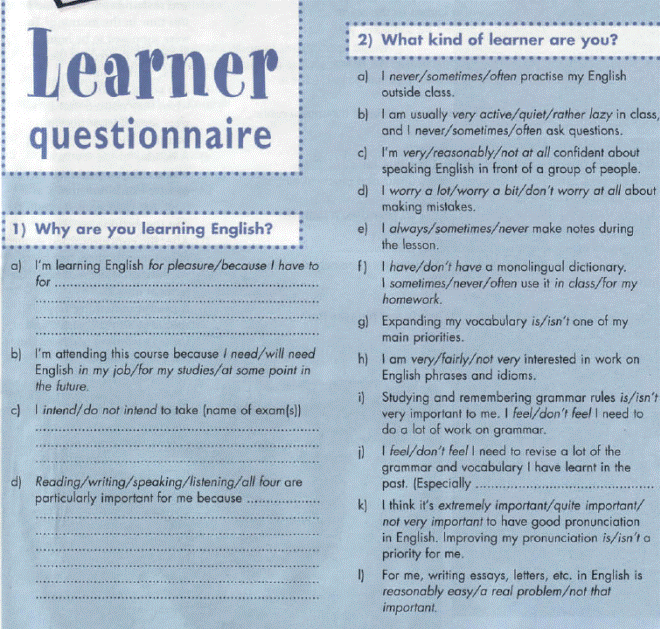

WhatТs an Eponym?
An eponym is a person, a place, or thing for whom or for which something is named, or believed to be named. For example, Elizabeth I of England is the eponym of the Elizabethan era.
You may know what a silhouette is, but do you know who Silhouette was? Silhouette is an eponym, a word derived from the name of a person, place, or thing. Étienne de Silhouette was a Frenchman. Why is his name associated with portraits cut from black paper? LetТs explore the origin of silhouette and three other interesting eponyms.
| Silhouette In 1759, during the Seven YearsТ War, there was a credit crisis. As minister of finance for France, Étienne de Silhouette took severe measures to save money. Frugality was his trademark. Frenchmen coined the expression à la silhouette to describe doing things cheaply. Since a portrait made out of a black paper cutout on a white background wasnТt costly, appreciators of the art form named it after the cheapest man they knew. Boycott Faced with economic hardship in the 1800s, a group of Irish tenant farmers petitioned their absentee landlord for reduced rent. Instead, the landlord sent his land agent, Charles C. Boycott, to evict the tenants. In response, the tenants and their supporters enacted a plan. They didnТt greet Mr. Boycott or conduct any business with him. Locals refused to work in his house, field, or stable. | The mail carrier didnТt deliver. Later, newspapers used the term to describe any voluntary abstinence from buying, selling, or dealing with someone as a means of coercion or protest. Jumbo In 1882, P.T. Barnum introduced the world to the newest star of his famous circus: an enormous elephant named Jumbo. As the crowds met Jumbo, they began to use his name to describe anything of large proportions. Sideburns One general of the American Civil War had a mustache and some facial hair on the sides of his face. Interestingly, he shaved his chin but allowed his mustache and side hair to grow together in one connected mass. His name was Ambrose Burnside and his distinctive facial hair inspired the word sideburns. |
Match the eponyms to the descriptions.
| biro frisbee hoover sandwich wellingtons (or wellies) |
a) This popular game is named after a 19th century American baker who baked pies in light circular metal tins. Children threw the empty tins around for fun._______________
b) Perhaps the most popular food in the world, this was named after an English aristocrat who spent most of his time gambling. So much, in fact, that he didn't have time to eat properly, but with this snack, he could still play cards-with one hand.____________________
c) These are not what he would have worn at the Battle of Waterloo - he would have looked
ridiculous! But every house in England has a pair of these, usually near the back door leading into
the garden. Green is the preferred colour.____________________
d) Known by this name in many English-speaking countries, these ballPoint pens were developed by two Hungarian brothers. For some reason, their name is not well-known in moSt of Europe._______________________
e) Named after the American company that first sold these machines at a low enough price for people to be able to buy them for use around the house. Easier to pronounce and shorter than the original word, the name of the company is often used for machines made by any company.___________________
Bribery and Corruption
Activity 1






